

Turkey Loses its Shine. What do terrorists, foreign spies, Christiane Amanpour and The Economist have in common?
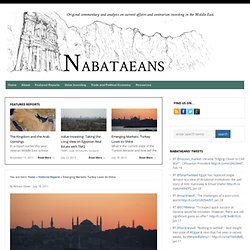
These unlikely bedfellows were “responsible” in some way or another, of inciting the wave of civil unrest that engulfed Turkey in June this year – according to the Turkish state media, that is. While it is common knowledge that Turkey’s ruling Justice and Development party (AKP) has been inclined, from time to time, to dip its toes in the proverbial conspiracy theory pond, the extent to which it has done so in recent weeks has left many observers slack-jawed. As the FT reports, During the month of protests, Mr Erdoğan not only blamed the demonstrations on an interest rate lobby – generally taken to refer to both international and domestic financiers – but also threatened to “choke” speculators and appeared to encourage supporters to use state rather than private Turkish banks. After The Boom: Risks to the Turkish Economy 2013. The Political Economy of Turkey In previous posts (here, here, here and here), we have discussed the history of political conflict and institutions in Turkey.
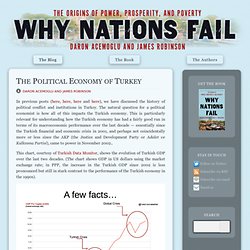
The Road Ahead for Turkey Some may read our account of Turkish institutions and political economy so far as bleak.
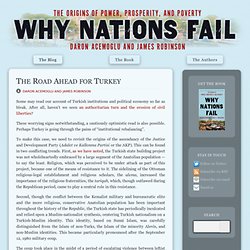
After all, haven’t we seen an authoritarian turn and the erosion of civil liberties? These worrying signs notwithstanding, a cautiously optimistic read is also possible.
Erdogan’s ire: next up, corporate Turkey. Guest post: Turkey unrest threatens financial flows and economic stability. Witch Hunt Burning Bonds as Erdogan Lashes at Koc: Turkey Credit. Investors are driving up bond yields of Turkish companies as concern mounts that Prime Minister Recep Tayyip Erdogan will take action against some for their alleged complicity in the unrest that spread this month in the nation.
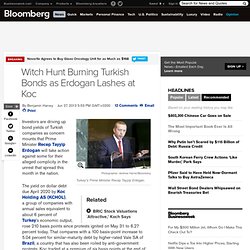
The yield on dollar debt due April 2020 by Koc Holding AS (KCHOL), a group of companies with annual sales equivalent to about 6 percent of Turkey’s economic output, rose 210 basis points since protests ignited on May 31 to 6.27 percent today. That compares with a 100 basis-point increase to 5.04 percent for similar-maturity debt by higher-rated Vale SA of Brazil, a country that has also been roiled by anti-government protests. Koc traded at a premium of six basis points at the end of May. While Brazil’s President Dilma Rousseff said she’d listen to the voice of the streets and pledged to give citizens a stronger say in government, Erdogan lashed out against what he says is a pre-planned effort to undermine Turkey’s economy.
Foreign Media Market Probe Rising Yields.
FDI in Turkey. Rodrik_Turkish economy after the crisis. How well did the Turkish economy do over the last decade? There has been much discussion in Turkey in recent days about the performance of the economy under the AKP government, occasioned in part by an exchange I had with Minister of Finance Mehmet Şimşek.
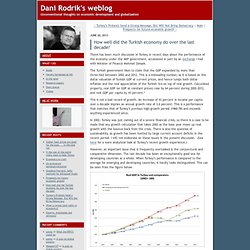
The Turkish government likes to claim that the GDP expanded by more than three-fold between 2002 and 2012. This is a misleading number, as it is based on the dollar valuation of Turkish GDP at current prices, and hence lumps both dollar inflation and the real appreciation of the Turkish lira on top of real growth. Calculated properly, real GDP (or GDP at constant prices) rose by 64 percent during 2002-2012, and real GDP per capita by 43 percent.* This is not a bad record of growth. In 2002, Turkey was just coming out of a severe financial crisis, so there is a case to be made that any growth calculation that takes 2002 as the base year mixes up real growth with the bounce back from the crisis.
Source: Conference Board database.
Turkey Project. This project is designed to enable policy-makers and decision-makers to gain a better understanding of Turkey as a country-in-transition Much of the academic and policy research on Turkey in the United States and Europe concentrates either on its geostrategic importance or more narrowly on the domestic challenges facing the country.
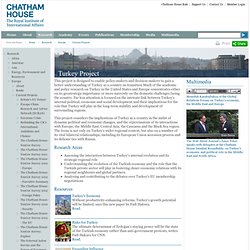
Far less attention is focused on the intricate link between Turkey's internal political, economic and social development and their implications for the role that Turkey will play in the long-term stability and development of surrounding regions. This project considers the implications of Turkey as a country in the midst of dynamic political and economic changes, and the repercussions of its interactions with Europe, the Middle East, Central Asia, the Caucasus and the Black Sea region. Research Areas Resources Turkey's Economy Without productivity-enhancing reforms, Turkey's growth potential will be limited, says this new paper by Fadi Hakura. Events Sponsorship. Is Turkey on the verge of a meltdown? Turkish Prime Minister Recep Tayyip Erdogan speaks to the deputies of his ruling Justice and Development Party during a meeting with Turkish parliament on Tuesday, June 18.
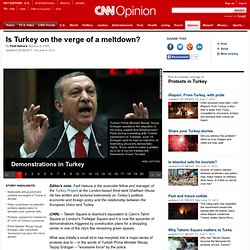
Erdogan said he had no intention of restricting anyone's democratic rights. "If you want to make a protest do it, do it, but do it within the framework of law," he said. Turkish performance artist Erdem Gunduz, center, is joined by others as he makes his silent protest in Taksim Square. As word of his gesture of protest spread, Gunduz became known as the "standing man. " The Political Economy of Turkey